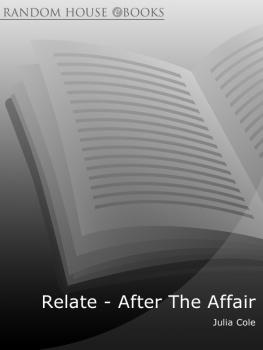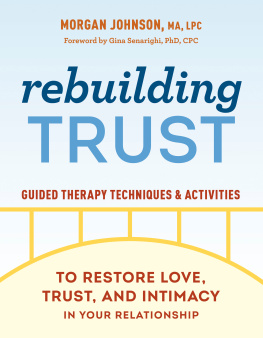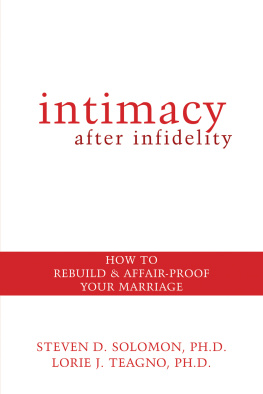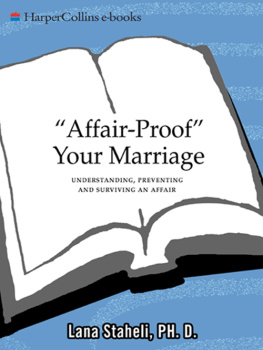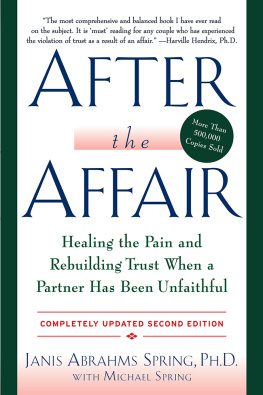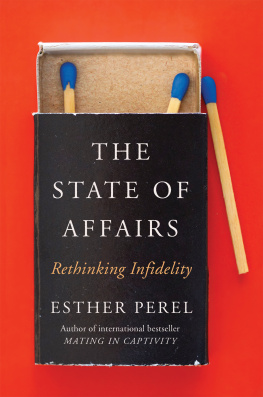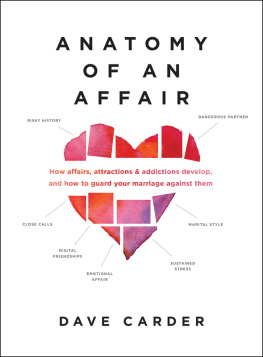Contents
About the Author
Julia Cole is a BACP accredited counsellor, psychosexual therapist and supervisor. She worked for Relate for 12 years and has been a counsellor for 25 years. She has worked as a counsellor for the NHS, a breast cancer charity and is currently a counsellor for the armed forces. Julia has written seven books on relationships and has previously written for many national magazines and newspapers, including being an agony aunt for The Sunday Express and Essentials magazine. She has appeared widely on TV and radio, chiefly commenting on relationships and family issues. She is married with one son and one daughter.
After the
Affair
How to Build Trust and Love Again
Julia Cole
relate
For Eric and John
Introduction
I have been a counsellor and therapist for 25 years. Over this time I have worked for Relate; as part of the NHS; for women dealing with life-threatening health concerns, including breast cancer; and now as a counsellor for the military and in private practice. I have seen hundreds of couples and individuals talking about affairs. For the majority of couples an affair is devastating. Most people find it a very difficult event to recover from, and many couples do not survive the impact. In my experience, around a third of couples I see are unable to rebuild the relationship once an affair has been discovered. Their sense of trust in their partner, or even friends and relations, is often crushed or smashed. Many years ago a young man told me of the affair of his wife with a friend: It was as if a glass jar had been dropped on the floor and I was trying to pick up all the pieces. I knew nothing would be the same again.
I have sat in many counselling rooms watching the tears, anger and desperation of the couple before me. And yet, some couples stay together, with a good portion I help saying that the affair brought problems to the surface and helped in the long-term. They ride the rough seas of the damage to their relationship and find a new way of relating to each other. Some affairs tell a couple that they needed to pay attention to one another, stop working too hard or spending all their time with the kids instead of their partner. All affairs are symptoms, not causes, of relationship breakdown. You may not realise this, and might even deny it, but it is the case. I have yet to counsel a couple where they went from a totally happy relationship to an affair overnight. The signs were there for the couple to read. This book aims to explain why this has happened, and then what to do once the affair has come out into the open.
Over the last 10 years I have realised that the way in which affairs are conducted has changed dramatically. Before the rise of the web and social networking sites, having an affair always meant meeting clandestinely in person and communicating via a landline or by letter. When I came to update this book, it became clear that nearly everything we took for granted about how relationships function has changed radically. Ten years ago email and the worldwide web were in their infancy. There was no Facebook, Twitter or YouTube. The idea that you could conduct your love life on your mobile phone or over the PC would have seemed unimaginable, but that is what has happened. For some people, their friends on the net are closer and more supportive than people they see every day in the flesh. We have become cyber literate and accept it as a crucial part of love and life. So it is obvious that people having affairs would use the new media. Interestingly, it is not just a matter of men and women meeting via the internet and going on to have affairs in person. Many people who have cyber relationships never meet the person they are emailing or texting, so it is possible to have all the emotional effects of an affair, without ever spending time in the same room with the person who they are in contact with. This is why this book contains a chapter entitled Is This an affair? to help you decide what you think about this change of relationships.
I believe that although the mode of relating through modern technology is new, the emotional effects of finding out your partner has conducted secret relationships are the same as they have been for hundreds of years. This is because the way we attach to one another is as it has been for most of human history: we find someone we want to bond with and form an intimate relationship based on trust. If this trust is broken, it hurts. However, the chief change of relating to others over the internet or phone is the speed at which we can conduct a relationship. It is possible to meet someone, form an attachment and drop them as soon as we feel bored, often by cutting them out of our friend list on a social networking site or deleting them from our mobile phone. In the same way we can eat on the run, we can meet and drop a relationship. This raises new issues for people having affairs or discovering their partner is having one. If it is all over in a flash, did it really happen? And if this is in doubt, does it do the same damage as a more traditional affair? Modern media can also allow an affair to be conducted in new ways. Sexting (sending pictures of yourself in sexy poses or erotic messages) is fashionable, as is using dating sites to look for potential partners whether you are single or not. Perhaps because these are a modern phenomenon, some people feel they cannot be described as an affair. But, as this book will tell you, the pain inflicted by many of these actions can be great. Couples can, and do, break up because of them. The long-term effect of having trust broken is the same, whether the relationship was over the PC or with a neighbour.
I have tried to distil my learning about affairs gleaned over the 25 years of my experience of counselling into this book. It is my hope that you will find it informative, supportive and enlightening, whether you have had an affair, discovered one, or tried to help a friend or relative survive an affair. Relate counsellors across the UK welcome all clients, whatever their sexual preferences, straight, gay or bisexual. Because this is an update of an earlier volume I tend to refer to heterosexual couples, but I hope that gay men and lesbians will find much of the advice helpful. This book is intended to help you make sense of an affair, and may be enough to support you through the experience. But if you need more help to unravel the reasons for an affair, Relate counselling can help you and your partner. You will find contact details . In a study of Relate clients, 98 per cent of respondents said they would recommend our services to friends and family, so Relate really can make a difference to troubled relationships.
PART I
WHAT IS TRUST?
CHAPTER 1
Building Trust
THIS BOOK IS about trust: what makes it work and what can break it. Most people, if asked, would say that trust is important in their relationships. Sometimes it is hard to put into words what trust actually is. In fact, many couples would probably say that they could not describe it, but knew what it felt like when it was gone. If you have ever encountered a partner you found you could not trust, you already know the pain, anger and sadness that a relationship without trust can cause. This chapter will help you to explore the nature of trust, how it affects individuals and relationships and how to cope when trust is broken especially after an affair.
Trust is important in many different kinds of relationship between family members, at work and in the community. For instance, in our families we need to believe that promises will be kept. At work, we need to know that our colleagues will support us and undertake their correct share of work. In our communities, we need to trust that our tax payments will be used properly to keep our roads in good shape and our bins emptied. If we are let down by a relative who does not keep a promise, discover that a work colleague is unsupportive, or find our rubbish on the doorstep for weeks, we are likely to respond by feeling angry and let down. The ability to trust, and to have that trust returned, is a crucial bond in any relationship an emotional glue that helps us feel secure and safe.

